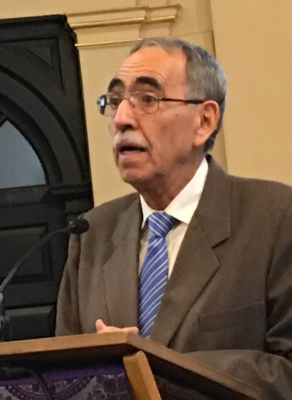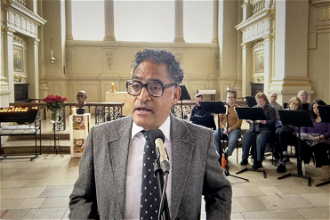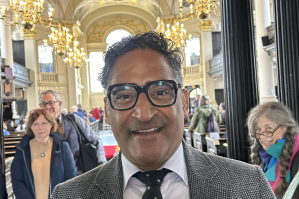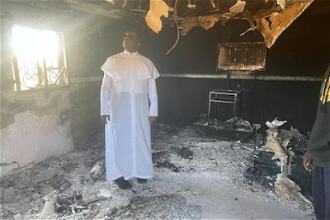Text: Ruben Zamora on Bl Oscar Romero

Ruben Zamora speaking - image Fr Joe Ryan
The Romero Trust invited Salvadoran diplomat, academic and social democratic politician Dr Rubén Zamora to be their guest speaker for Romero Week 2018. The text of the speech he gave at St Martin in the Fields, Trafalgar Square last Saturday, follows below:
Sisters and brothers in Jesus Christ
We hope, and we believe, that Oscar Romero will be canonized this year. But I have to tell you, we do not wish him to be reduced to a plaster saint. Nor do we want his teaching and his legacy to be diluted into insipid comfort food.
When Romero became archbishop, El Salvador was in crisis. Violent conflict erupted, and civil war was on the horizon. Monseñor Romero became our prophet. A prophet of peace. And an advocate of justice. We desperately need his prophetic witness today, in crisis-ridden El Salvador, and perhaps too, I will humbly suggest, here in Britain and across the world.
Throughout history, the prophetic path is one of the most radical expressions of God's presence in our lives. And it is possible to establish a line of continuity, starting from the Old Testament prophets, as they showed prophesy to be an inseparable part of the relationship with God, and a vehicle of communication between God and his people. And then on to Jesus, as a prophet, opening a new period in history. And then come our contemporary prophets, amongst whom Monseñor Romero has a prominent place. We have heard the words of the prophet Isaiah in one of today's readings. My endeavour now is to reflect on the prophetic message of Romero. Romero as a prophet of peace and justice.
We must note that, even before the Church today is recognising Archbishop Romero as a saint, he has already been declared a martyr. And martyrdom is one the most common virtues associated with the gift of prophecy.
What are the characteristics of a prophet?
In the first place, the appearance of prophets tends to come in periods of crisis. In the Bible it is during foreign domination, or when the people abandoned their alliance with God, or when involved in war or suffering a tyranny. This was the social and political environment for the birth of Jesus. And, for our Romero, it is exactly in that setting that his prophetic voice appears in our history. When his message started to develop, it was in a deep crisis of the military regime that had dominated the country for nearly half a century -sustaining its power on human right violations, miserable poverty and facing a growing social unrest. Romero clearly perceived that our society was on the path to civil war. And he became involved in desperate efforts to stop it. At the international level he sent an Open Letter to President Carter. He spoke privately to military leaders but publicly addressed the government and the popular organizations. I was a witness of many of those initiatives.
Secondly, the prophet is usually chosen by God from among the common people, and from outside the religious apparatus. In the Old Testament we have many examples of this. But the best example is Jesus, coming from a family of very low income - and born in a stable. In the Christian churches the situation is more mixed, some of the prophets come from the ranks of the clergy and tend to be very critical of the official Church.
In this sense, we could say that Romero is a clear example of the prophet insofar as his parents were common people, living a very modest life in a small town. And he became a prophet after he was consecrated archbishop. In the history of the Church, we have 'Saint' bishops and we have 'heretic' bishops; but very few 'prophet' bishops. In Romero, one of the most original characteristics of his prophetic ministry was his fidelity to the Church. As Pope Francis has said, Romero was a martyr during his life, in his death - but also after his death. That is because, as Pope Francis reminds us, he was attacked with the weapon of the tongue. He suffered incomprehension, insults and even hatred, including from priests and bishops. Nevertheless, he remained faithful to his Ignatian episcopal motto: "to think and feel with the Church". Never, in his sermons or pastoral letters, is there a word of denunciation in response to these attacks - no matter the pain his brother bishops made him suffer.
The third characteristic of the prophet is that their mission opens with an extraordinary call from God that changes their life. In the Old Testament, usually the call was made directly by God. Then, God himself sent his own Son in the person of Jesus. And in the case of Romero, it was a personal confrontation with the brutality of the regime, the assassination of Father Rutilio Grande, his close spiritual friend.
A fourth characteristic is that the prophet is involved in the lives of the people. Romero had a simple life-style. He refused to live at the archbishop's residence; and instead he lived in two rooms at the hospital for people with terminal cancer. Every single week he went out visiting the poor communities; and he was habitually telling them "you are my nourishment".
His central theme was the suffering of the oppressed - which was leading inevitably to civil war. His conclusion was that a society can only merit being called Christian if social justice reigns in human relations. That is why he used to say: "I am the voice of the ones who have no voice". His aspiration was a society with no social injustice, in other words what we call the construction of the kingdom of God. And for him, the response of Jesus to Pilate has this meaning. Unless we now work towards the building of a 'different world' then "My Kingdom is not of this world".
In the same vein when he talks to rich and powerful people, his words were not to condemn. But rather, to stress the equality of all, that we are all children of God - and therefore we have the responsibility to care for all. Romero was a constant critic of the extreme inequality of our society, of the consumerist habits we have adopted. He went so far as to warn the rich with a metaphor: "it is better to take off and give away your rings than to risk your fingers".
At the same time, his prophetic message always incorporates the vision of a different future and a path to achieve it. This is the essence of the message from the Sermon on the Mount - denunciation of injustice and offering of hope. In this sense, the prophetic discourse in the Old Testament, and in Jesus, is followed by Romero. In his sermons and pastoral letters, the criticism of the political and social illness of Salvadoran society, was invariably followed by a call to Christians for action to change it - and an expression of hope in the possibilities of achieving such a change.
A fifth characteristic of the prophetic task is the role of developing the consciousness of the people. Romero is instrumental in the concientisation of our people. Because in a critical crisis situation, it is absolutely necessary that society becomes conscious of the need for change. Romero's fundamental task as prophet was to lay bare the reality to all; denounce injustices; and contrast them with the teaching of Yahweh and to demand its fulfilment - just as Isaiah was doing more than 2000 years ago.
His prophetic discourse is a very direct one. It uses a language that the common people could understand so that there was clarity as to whom he was directing the criticism and how any Christian should act. Romero's sermons were frequently interrupted by applause from the community. It was their way to say, "Yes Monseñor, we understand and we agree".
But at the same time his words ignited the fury of those who felt accused by Archbishop Romero; or felt a contradiction with their religion. And it led them to try to silence his voice. The official language of our church has the tendency to be more interested in fidelity to doctrine and tradition than to communicating and educating the people. These days, when I hear Pope Francis speaking, I am reminded of the language of Monseñor Romero and I feel myself closer to the Church.
Every Sunday Mass, Romero's sermon started with a review of the events of the week - the good news and the bad news. The human rights violations, the lists of tortured or disappeared persons, the corruption in society and the government, and the claims of workers for decent wages. Then came his commentary on those facts, using the Gospel as the guide. And finally, came the call for action as the responsibility of all Christians - and usually, an expression of hope for a better time.
Monseñor Romero's life and message is a challenge to all of us. To honour his memory is to follow his teachings and his praxis. This is surely the only genuine way to keep him alive in our societies. The canonization that we are waiting for is no more than the Church confirming that his path is the right and proper way for a Christian to live. Therefore, as Christians, the question is: if Romero were alive today what message would he be giving us, to encourage us and to express, share and act with our brothers and sisters - and thereby become true prophets of peace and justice?
As Christians, the prophetic vein is a consequence of being followers of Jesus Christ, and to have Monseñor Romero as a saint is the Church telling the world that he is an example to be followed by all of us.
Brothers and Sisters, we live in a world that is in crisis, too many violations of human rights, too much violent conflict, too much inequality between and inside nations, too much disrespect for Mother Earth. Our societies are clamouring for justice and peace. I believe we must ask Saint Romero to illuminate our mission and our ministry; and to give us the courage to denounce grotesque injustice in the street outside and across the planet; to reject the paths of violence and counterviolence, and therefore lay the foundations to build sustainable peace - as we strive and struggle to find the kingdom of God. He will surely hear us and give us the understanding, the will and the perseverance to make our contribution to this great task - which is being an active part of the biggest miracle of history: the construction of God's kingdom. Amen.





















